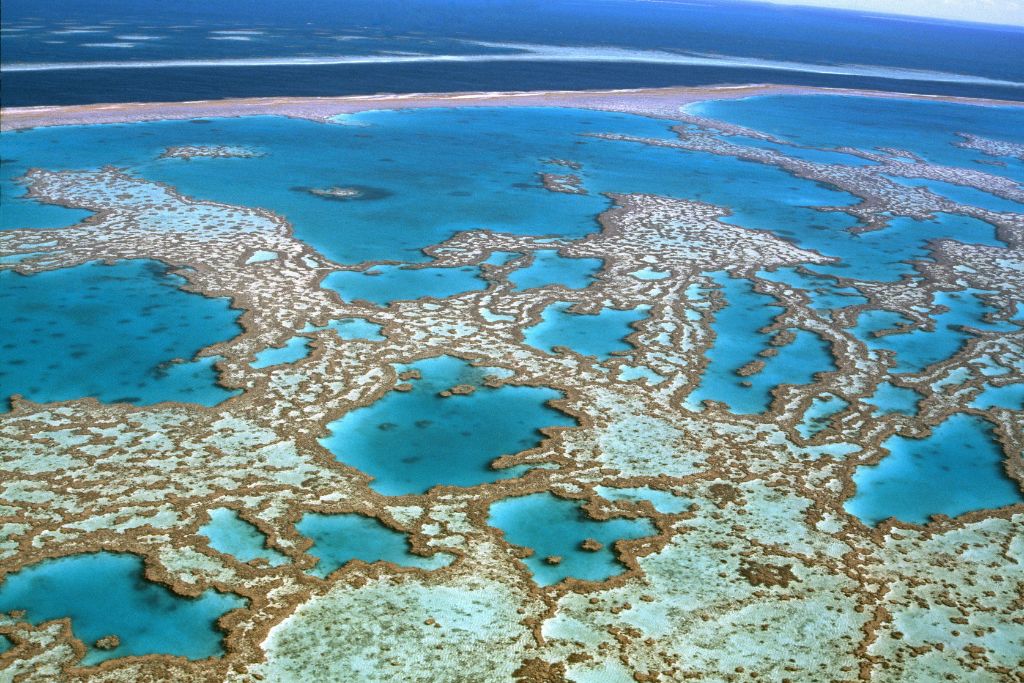In an update issued on Friday, the Great Barrier Reef Authority said heat stress from climate change-driven rising ocean temperatures is responsible for the “unfolding bleaching event.
—
Australia’s Great Barrier Reef, the world’s largest coral reef system, is in the grip of a mass coral bleaching event, the fifth in eight years, the marine park authority has confirmed.
In an update on the reef’s health issued on Friday, the authority said that aerial surveys on over 300 inshore, midshelf, and offshore reefs confirmed that “widespread, often called mass, coral bleaching event is unfolding across the Great Barrier Reef,” which covers an area of about 344,400 square kilometres (133,000 square miles) – larger than the UK and Ireland combined – off the coast of Queensland.

Coral bleaching occurs as a heat stress response from rising ocean temperatures, which drives algae away from coral reefs, causing reefs to lose their vibrant colours. Recent large-scale marine heatwaves have led to more frequent and severe mass bleaching events around the world, with reefs’ natural recovery processes struggling to keep up. Indeed, while a bleaching event is not directly linked to corals’ death, more frequent and intense heat stresses make corals more vulnerable to diseases, slowing down their recovery and limiting their ability to spawn.
“Aerial surveys of the Reef have revealed prevalent shallow water coral bleaching on most surveyed reefs and results are consistent with patterns of heat stress that has built up over summer,” the update read.
According to the World Meteorological Organization (WMO), sea surface temperatures have been “persistently and unusually high” since May of last year. While this was partly due to the return of El Niño last year, heat-trapping greenhouse gases remain “unequivocally the main culprit,” as oceans absorb more than 90% of the extra heat in the planet’s climate system that results from human-made global warming.
The reef has already undergone six mass bleaching events, four of which happened in the past eight years. The events in 2016 and 2017 were so severe that they cost the death of 50% of Australia’s iconic reef, the world’s largest and longest system, home to 400 types of coral, 1,500 species of fish, and 4,000 types of mollusk.
“Although bleaching is becoming more and more frequent, this is not normal,” said Lissa Schindler, a campaign manager with the Australian Marine Conservation Society, following the mass bleaching event of 2022. “We should not accept that this is the way things are. We need to break the norms that are breaking our reef.”
In Friday’s statement, the marine park authority said it will continue conducting broadscale aerial surveys in the coming weeks to determine the extent of bleaching in the region and provide a more comprehensive assessment of the reef’s health.
But Australia’s reef is not the only one at risk from rising ocean temperatures. Last week, the coordinator of the US National Oceanic and Atmospheric Administration’s (NOAA) Coral Reef Watch Derek Manzello said it was likely that the entire Southern Hemisphere would experience bleaching this year.
“We are literally sitting on the cusp of the worst bleaching event in the history of the planet,” the ecologist said.
More on the topic: Record Ocean Temperatures Push Coral Reefs to Brink of Fourth Mass Bleaching Event
This story is funded by readers like you
Our non-profit newsroom provides climate coverage free of charge and advertising. Your one-off or monthly donations play a crucial role in supporting our operations, expanding our reach, and maintaining our editorial independence.
About EO | Mission Statement | Impact & Reach | Write for us


















